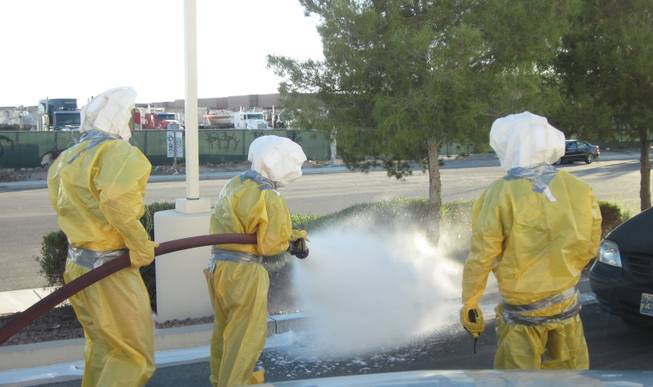
Clark County Fire Department Photo
Clark County firefighters, outfitted in special clothing, douse a beehive with foam Sunday, Oct. 28, 2012, near Nellis Air Base. A group of children had disturbed the hive, housed in a sprinkler box, causing the bees to start attacking the children.
Monday, Oct. 29, 2012 | 4:27 p.m.
The weekend attack of bees on a Las Vegas family serves as a stark reminder that the valley is populated with the fiercely defensive Africanized “killer” bees, which may attack as a swarm when upset by a sharp noise or when their hive is disturbed.
In this case, six children unwittingly disturbed an active beehive housed in a sprinkler box Sunday at the intersection of Marion Drive and Alto Avenue, near Nellis Air Base. The angry pests swarmed the family to protect their nest, giving their lives with each sting. The bees stung all six children, the youngest just 18 months old, plus the children’s mother, according to Clark County Fire Department spokeswoman Stacey Welling. One of the family members endured dozens of stings; none of the family members, however, required hospitalization.
Clark County firefighters, who were called, donned protective suits and doused the bees and their hive in foam.
But the trend Nevada Department of Agriculture entomologist Jeff Knight sees is that the “killer bees” tend to be more active in months with mild weather, and especially so in the spring. He’s not sure exactly why – whether it be the temperature or innate need to pollinate plants – but it’s a truth he’s noticed for years.
Knight’s advice if you encounter the bees? Cover your eyes and mouth and run, as fast as you can.
“They key in on the CO2 that’s coming out of your mouth and they key in on the shape of your eyes (for their attack),” he said. “If you can run about a quarter of a mile, they’ll stop chasing you.”
If possible, avoid them altogether.
“You never know what is going to set these guys off,” Knight said.
Africanized honeybees, known as killer bees, are well established in Nevada.
The Africanized bee is a hybrid of African and European honeybees, neither of which is native to the Americas. They typically nest in places where people may inadvertently disturb them, prompting attacks. They sting in large numbers and will chase a target up to a quarter-mile.
The Africanized bee – known for its short temper and its tendency to invade other colonies – can only sting once. After the bee attacks, its innards are ripped, and the insect dies; a suicide for the greater good of the colony.
If you do encounter these aerial attackers, try not to aggravate them said Greg Cassell, a battalion chief with the Clark County Fire Department. Watch your step. They can be found in tree stumps, brick walls, sprinkler boxes, and even in the attics of houses.
“The most important thing you want to do is not disturb them,” said Cassell.
If a person is stung, the stingers can be scraped off with a credit card or other hard edge. Anyone stung more then 10 times, Cassell said, should seek medical attention as a precaution.
If you should come across the pests, call a professional to handle them. Welling said the Nevada Pest Control Association, 702-385-5853, keeps a list of licensed removal services.

Join the Discussion:
Check this out for a full explanation of our conversion to the LiveFyre commenting system and instructions on how to sign up for an account.
Full comments policy